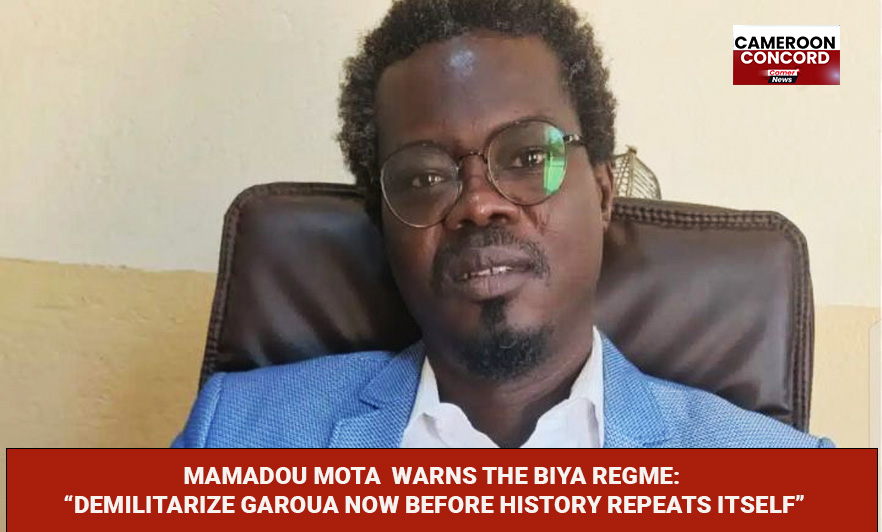Garoua Under Siege: Mota’s Letter to the PM

GAROUA (Cameroon Concord | Political Desk) —
The President of the Liberal Reform Council (LRC), Mamadou Mota, has sounded a stark warning to Cameroon’s Prime Minister, denouncing what he calls “the militarization of Garoua” by the Minister of Territorial Administration (MINAT) and the Secretary of State for Defence (SED). In an open letter released late Tuesday, Mota accuses the government of transforming the post-election environment into a climate of intimidation, repression, and fear.
“This militarization is not law enforcement,” Mota writes. “It is political provocation — reckless, cynical, and potentially explosive.”
The letter, which has since circulated widely on social media, draws chilling parallels between the current troop presence in Garoua and the early days of militarization that preceded the conflict in the North-West and South-West regions.
A Warning Wrapped in History
Mota’s rhetoric deliberately revisits one of the darkest chapters in Cameroon’s modern political history. He reminds the Prime Minister that it was the same security reflex, arrogance, and disregard for local sensibilities that helped ignite the armed conflict in the NOSO.
“The same MINAT, through his arrogance and refusal of dialogue, helped spark the disaster that has destroyed the NOSO,” Mota warns.
By invoking that memory, the opposition figure aims to shift accountability away from abstract “security operations” toward personal political responsibility. His argument is that repression disguised as stability is not merely ineffective — it is catastrophic.
Analysts reading the letter note that Mota is not only appealing to conscience but attempting to re-frame the national conversation around state legitimacy versus state force. It is a pointed reminder that legitimacy cannot be maintained at gunpoint.
A Political Fault Line Exposed
What makes the Garoua case particularly sensitive is timing. With tensions high following the 2025 presidential election and growing evidence of public dissent across northern regions, the heavy deployment of soldiers has been seen by many as a direct response to Issa Tchiroma Bakary’s self-declared victory and the shifting political mood.
Mota’s phrasing — “the government is replacing dialogue with the cannon, mediation with the képi” — encapsulates a moral dilemma the ruling elite has yet to solve. For forty-three years, power in Cameroon has been enforced through institutional fear. Mota’s call to “disarm Garoua” challenges that orthodoxy head-on.
According to one analyst contacted by Cameroon Concord, the message is “less about Garoua alone than about a new post-Biya grammar of power — one that must recognize the limits of coercion.”
The LRC leader’s demand that the Prime Minister recall troops “immediately and decisively” also places moral pressure on civilian authorities, forcing them to choose between loyalty to hierarchy and accountability to citizens.
The Shadow of NOSO and the Cost of Silence
The emotional core of Mota’s letter lies in its recollection of the NOSO catastrophe — thousands dead, hundreds of thousands displaced, and entire towns destroyed. The piece functions as both a political rebuke and a moral indictment of Paul Atanga Nji’s legacy, whom Mota portrays as an architect of avoidable conflict.
By stating that “history does not just repeat itself — it sometimes screams for vengeance,” the letter merges historical trauma with prophetic warning. It asks the government whether it has learned anything from a decade of bloodshed.
Observers see this as a subtle but devastating critique of the ruling system’s inability to pivot from security control to political dialogue. In that sense, Mota’s open letter does what few opposition statements manage: it links past state failure to the threat of immediate recurrence.
A Plea, a Threat, and a Mirror
In its conclusion, the text oscillates between plea and ultimatum.
“Your silence, your inaction, or your tacit approval will make you not the guarantor of national unity, but the accountant of the next tragedy.”
That line — now viral under the hashtag #GarouaSousSiège — has become the central quote of the debate. It positions Mota as a reluctant prophet, one who insists that Cameroon’s unity cannot be preserved by fear.
For Cameroon Concord, the broader significance of this letter lies in its timing, tone, and target. It is not only a cry of alarm but an inflection point in post-election discourse. As the country stands at the edge of political transition, Garoua has become a litmus test for whether the government has truly learned from its violent past.
If the Prime Minister ignores this warning, history may indeed repeat — not as tragedy, but as self-inflicted farce.
- Details
- News Team
- Hits: 1381
